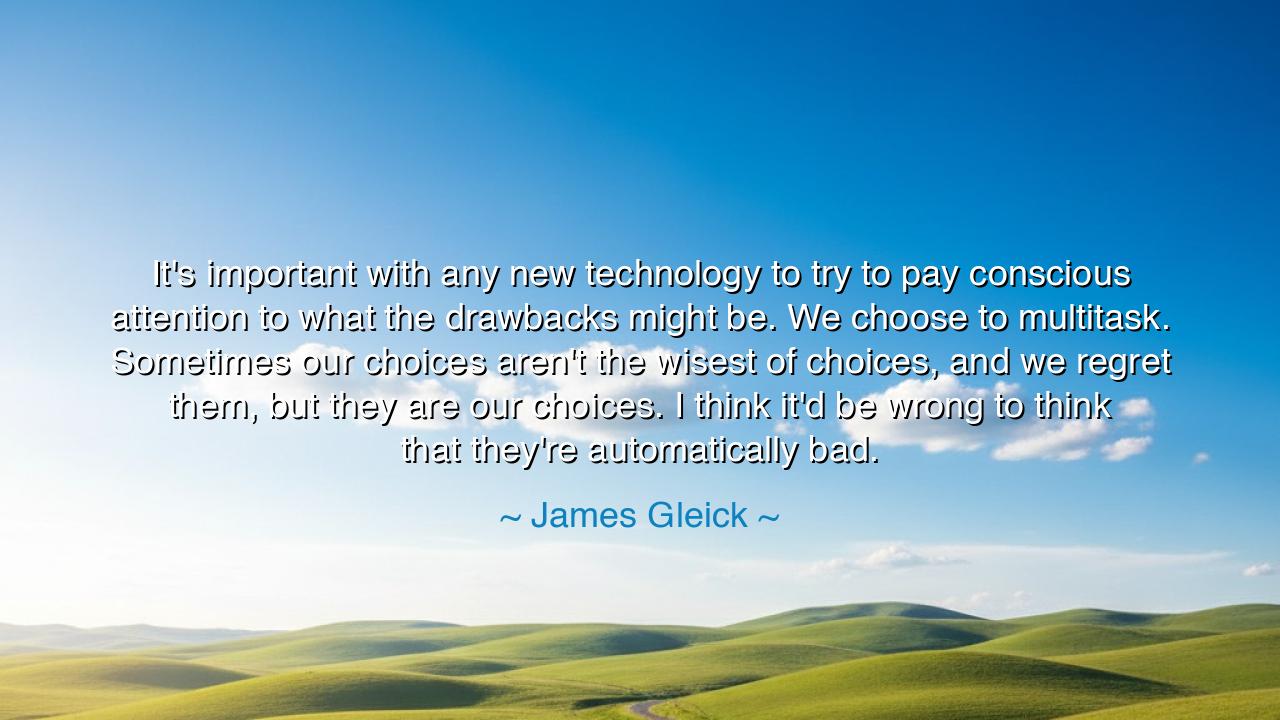
It's important with any new technology to try to pay conscious
It's important with any new technology to try to pay conscious attention to what the drawbacks might be. We choose to multitask. Sometimes our choices aren't the wisest of choices, and we regret them, but they are our choices. I think it'd be wrong to think that they're automatically bad.






Hear now the wisdom of James Gleick, who speaks with the clarity of a scribe watching the march of time: “It’s important with any new technology to try to pay conscious attention to what the drawbacks might be. We choose to multitask. Sometimes our choices aren’t the wisest of choices, and we regret them, but they are our choices. I think it’d be wrong to think that they’re automatically bad.” These words, though uttered in the language of our day, carry the cadence of timeless counsel. They remind us that invention is never without shadow, and yet it is not the invention itself that is evil—it is the spirit with which men and women wield it.
For from the earliest dawn of mankind, when Prometheus brought the gift of fire, the ancients knew that every boon bears both blessing and peril. Fire could warm the home, but it could also devour forests. Iron could craft the plow, but also the sword. So too, says Gleick, with new technology: we must not tremble before it as if it were a demon, nor embrace it blindly as if it were a god. We must instead walk with open eyes, discerning both light and shadow, so that our hands may guide it toward wisdom.
The heart of his message lies in the word choice. For men are not passive victims of invention; they are the wielders of it. When we multitask, shifting our attention from one thing to another, sometimes we falter, sometimes we scatter our strength and weaken our purpose. Yet even then, it is not the tool that betrays us—it is our own decision. To blame the loom because we weave poorly is folly; to curse the stylus because our words lack truth is blindness. Gleick calls us back to responsibility, to remember that we are not swept along like leaves in the river of progress, but rowers upon its waters.
Recall the tale of the telegraph, that miracle of the nineteenth century. Before its coming, messages traveled at the speed of horse or sail. With its wires strung across continents, men could speak across oceans in moments. Some heralded it as the uniting of mankind; others feared it would fragment the mind, distract governments, and flood nations with trivialities. And indeed, both were true. Wars were hastened, stock markets surged with rumor, yet families also rejoiced at hearing news from distant kin. The technology was neither angel nor demon. It was the hand of man upon it that decided its use.
Gleick’s words remind us, therefore, not to fall into extremes. Too often, when faced with new invention, people either worship it or despise it. Yet the truth lies in balance. To say that multitasking is always evil is as false as saying it is always good. There are moments when scattering attention brings ruin, and moments when it allows creativity to flourish. Wisdom is not found in blanket condemnation, but in conscious discernment.
O children of tomorrow, let this be your guide: when new tools arise—as they always will—do not be among the fearful who cling only to the old, nor among the reckless who plunge blindly into the new. Instead, be among the mindful. Ask yourself: What are the drawbacks? What are the blessings? What is gained? What is lost? And above all, remember: I choose.
Thus the teaching stands clear: technology is not destiny—it is opportunity. Regret will come when choices are made unwisely, but responsibility rests with the chooser, not the tool. Therefore, practice conscious living. Pause before you take on ten tasks; ask whether your attention is divided too thin. Reflect upon how your tools shape your habits. And when you err, do not curse the invention—learn from your choice, and choose anew.
For in the end, Gleick teaches us this: the power of man is not in the tools he makes, but in the wisdom with which he uses them. Walk, then, as guardians of your own decisions, lest you become slaves to the very wonders you once created.






AAdministratorAdministrator
Welcome, honored guests. Please leave a comment, we will respond soon